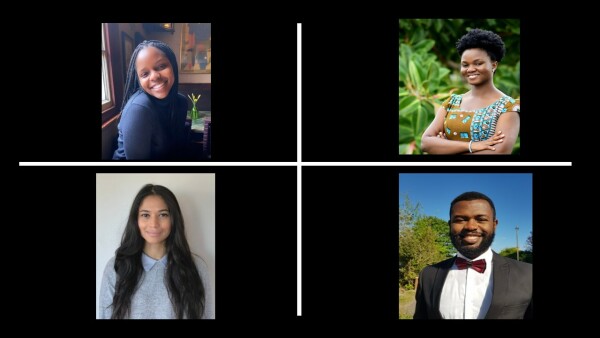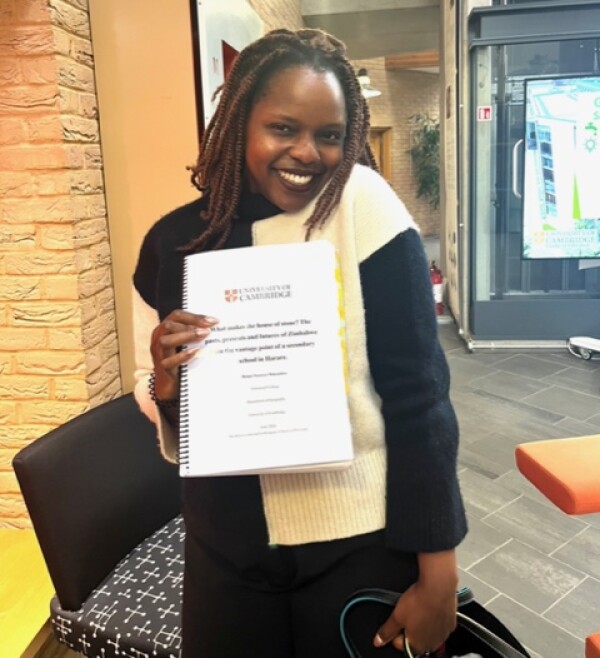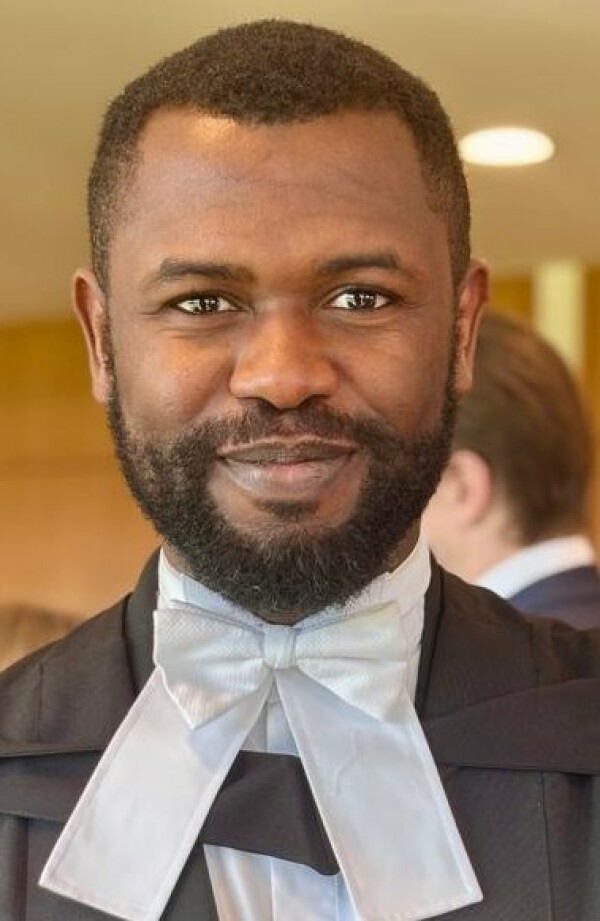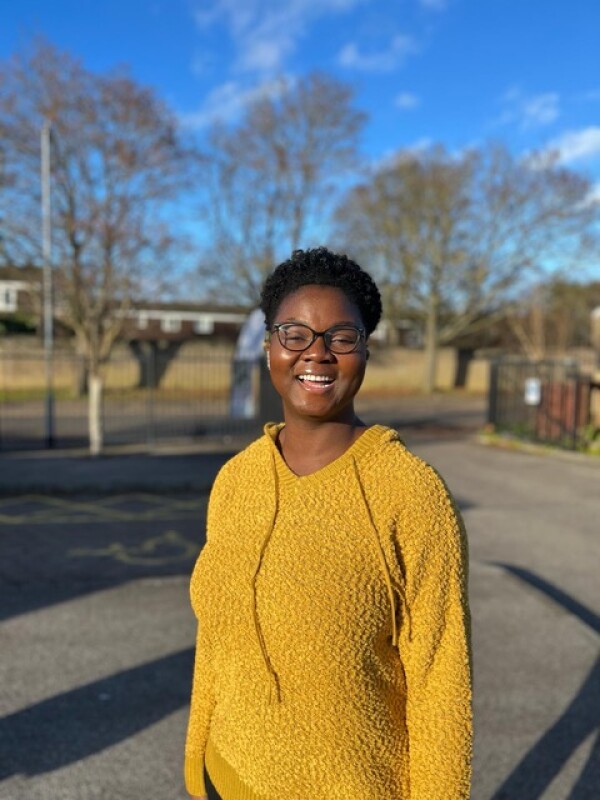2020- 2021 Cohort

These are photos of the fourth cohort of PhD students sponsored by Cambridge-Africa when they started in the academic year 2018/2019.
Starting from top left (clockwise): Matipa, Priscilla, Ernest and Nikita.
Find out what they are up to below:

Matipa Mukondiwa
|
Full name |
Matipa Mukondiwa |
|
Department where you did your PhD |
Geography |
|
PhD supervisor |
Adam Branch and Sarah Radcliffe |
|
Title of PhD thesis |
What makes the house of stone? The pasts, presents and futures of Zimbabwe from the vantage point of a secondary school in Harare. |
|
Year of completion |
2024 |
|
Current place of employment |
|
|
Position at place of employment |
Consultant |
Where are you at the moment? |
|
I work remotely for a public intellectual in the UK (Professor Nicola Rollock). The current project my team is working on was commissioned by UCU and is about documenting the experiences of Black Prison Educators in the UK. |
Tell us about your time at the University |
|
I had come from Oxford where I did my master’s in African Studies, so I did not experience too much culture shock at Cambridge. What I am most proud of was starting Black in Geography, a seminar series in my department that foregrounded the work and thinking of Black Geographers in a historically white discipline. |
Tell us about your experiences since leaving the University |
|
As I mentioned earlier, I am currently a consultant working remotely. I am really happy to be done with the PhD as it was a challenging time in my life. More than the degree, what I cherish and take pride in is the friendships Cambridge gave me. |
Alumni wisdomIf you could offer a piece of advice, a tip or simply some words of encouragement to those who have travelled from their home countries in Africa to undertake their PhD at the University of Cambridge, what would it be? |
|
By making it to Cambridge, I know you will work hard and go the extra mile – so please make a note to just enjoy yourself and have fun!!! |

Ernest Aguinam
|
Full name |
Ernest Tochukwu Aguinam |
|
Department where you did your PhD |
Department of Veterinary Medicine |
|
PhD supervisor |
Prof. Jonathan Heeney and Dr Barbara Blacklaws |
|
Title of PhD thesis |
Infection- and Vaccine-Induced Immune Responses to SARS-CoV-2 and Other Human Coronaviruses |
|
Year of Completion
|
2024 |
|
Current place of employment |
|
|
Position at place of employment |
|
|
Email address |
|
|
|
|
Where are you at the moment? |
|
I am currently working on some manuscripts for publication based on my PhD studies. I also spend more time with my family, particularly my twin toddlers who are an absolute bundles of joy and whom I saw less of during the busy periods leading up to my thesis submission and viva. |
Tell us about your time at the University |
|
My decision to transition from a five-year career in clinical veterinary practice in Nigeria to research was rooted in a profound desire to understand and combat infectious diseases. I recall a particularly challenging case of canine parvoviral enteritis, where I questioned the efficacy of prior vaccination and sought to unravel the complex immunological responses at play. This experience, and others like it, ignited a passion to apply my knowledge to a broader context, encompassing both animal and human health. My MPhil and PhD studies at Cambridge, focusing on the virology and immunology of zoonotic viruses such as Norovirus and SARS-CoV-2 and on vaccine immunogenicity, provided the foundation to realize this aspiration. But the transition from clinical veterinary practice to the rigorous academic environment of Cambridge, coupled with the need to adapt to a new culture and environment, presented significant challenges. However, through diligent effort, exceptional supervision, and the support of the Cambridge community, I thrived in both degree programs. A notable achievement during my PhD was collaborating with the Royal Papworth Hospital to investigate COVID-19 vaccine responses in vulnerable, immunocompromised patients and subsequently publishing our findings. Beyond academic accomplishments, I cherish the informal discussions with colleagues, often over lunch or in pubs, where many of my current and future research ideas originated. I also hold dear the memories of potlucks with fellow African scholars, weekend getaways with friends, college badminton games, and singing in church choirs. |
Tell us about your experiences since leaving the University |
|
Since completing my PhD, I have continued my collaborative work on vaccine development with my former laboratory and external collaborators. A significant achievement is the recent submission of a manuscript, led by a former colleague, describing a potentially groundbreaking broad-spectrum vaccine against highly pathogenic H5 avian influenza. My efforts have been primarily directed towards transforming my thesis findings into publishable manuscripts and contributing to joint publications. The job search process, including application submissions and interviews, also required substantial time. Having recently graduated, I look forward to commencing a postdoctoral research fellowship at the Wyss Institute for Biologically Inspired Engineering at Harvard University. There, I will utilize organ-on-a-chip technology to examine the role of the immune system in vaccine efficacy among other projects. |
Alumni wisdomIf you could offer a piece of advice, a tip or simply some words of encouragement to those who have travelled from their home countries in Africa to undertake their PhD at the University of Cambridge, what would it be? |
|
If you are coming to Cambridge from Africa, remember that you are one of many equally great minds across the world that the university has brought together. Some of the great ideas for your research may not come from reading textbooks but from informal chats with colleagues and friends and attending your local seminars. So, reach out and connect with people even as you study in the traditional ways. Publish early if you can. Be open to new ideas and suggestions as you follow where your research leads. And to navigate the emotional rollercoaster that accompanies many a PhD journey, do not underestimate the power of community. |
Publications |
|
During my PhD, I have published as first author and contributed to other publications as listed below:
|
|
|

Priscilla Sena Bretuo
|
Full name |
Priscilla Bretuo |
|
Department where you did your PhD |
Education |
|
PhD supervisor |
Pauline Rose |
|
Title of PhD thesis |
Enhancing Transformative Learning For Marginalised Girls: A Critical Analysis of the Role of Pedagogical Processes in anAccelerated Education Programme In Ghana |
|
Year of study (start year – finish year) |
2020-2025 |
|
Current place of employment |
Education Endowment Foundation/UNICAF (Each part time) |
|
Position at place of employment |
EEF - Research Assistant UNICAF – lecturer in Education |
|
Email address |
prixybret@gmail.com |
Where are you at the moment? |
|
I am currently working as a Research Assistant with Education Endowment Foundation, where my work entails research and data synthesis. In addition to that, I am working part time with UNICAF online as a lecturer in Education. I am also working on research project with the faculty of Education in Cambridge on Equitable partnerships between the Global North and South. I am also working on starting my own organisation focused on translation of African-led and African-centred education research for policymakers, funders/donors, practitioners and the general public as well as training and mentorship opportunities for early career researchers in Africa and low/least developed countries. I have one daughter who means the world to me and soon expecting my second. |
Tell us about your time at the University |
|
I come from a rural farming community in Amedzofe in the Volta Region of Ghana, where access to quality education was limited. My early experiences—missing school to help my grandmother on the farm—shaped both my understanding of marginalisation and my deep appreciation for education. When I eventually moved to the city and restarted school, I became acutely aware of the systemic barriers that prevent many children, particularly girls, from accessing and thriving in education. This background profoundly influenced my academic journey. My interest in education research—especially in issues of pedagogy, inequality, and cultural relevance—developed during my undergraduate and master's studies, and was sharpened through practical teaching and research roles in Ghana and Mauritius. These experiences revealed the disconnect between policy, pedagogy, and the lived realities of marginalised learners, especially girls. Coming to Cambridge for my PhD at the Faculty of Education was both a personal and intellectual milestone. Cambridge offered the intellectual space and critical mentorship to push boundaries. My doctoral work focused on transformative learning for out-of-school girls in Ghana, interrogating how educational interventions engage (or fail to engage) with local knowledge and socio-cultural contexts. Beyond research, I found community Cambridge and engaged in activities focused on decolonising education and supporting students from the Global South. These remain some of my most enduring and transformative memories of Cambridge |
Tell us about your experiences since leaving the University
|
Since leaving the University of Cambridge, my journey has been both enriching and purpose-driven. I am currently working as a Research Assistant with the Education Endowment Foundation, where I contribute to large-scale research syntheses focused on improving educational outcomes. Alongside this, I lecture part-time with UNICAF Online University, teaching postgraduate education courses to students across Africa—an experience that keeps me connected to the continent and committed to accessible, quality education. I have also remained actively engaged with the Faculty of Education at Cambridge, collaborating on a research project that explores equitable partnerships between institutions in the Global North and South. This work builds directly on my doctoral research and reflects my ongoing interest in decolonising educational development. A personal passion project that I’m now laying the foundation for is a new organisation aimed at translating African-led and African-centred education research for wider audiences, including policymakers, funders, and practitioners. The initiative will also offer mentoring and capacity-building for early career researchers across Africa and low-income contexts. Balancing these professional commitments with family life has been both challenging and rewarding. I’m a proud mother to a young daughter and currently expecting my second child. These life changes continue to shape how I approach research and education. |
Alumni wisdom |
|
Remember that your perspective is valid, powerful, and needed. Studying at Cambridge can be both inspiring and overwhelming, especially coming from a different cultural and academic context. Don’t shrink to fit in—draw strength from your roots and let your lived experience inform your interactions and research. Seek out support, build community, and prioritise your well-being. Trust that you belong here, not despite your background, but because of it and when it gets hard, remember, you’re paving the way for many more after you. |
Publications (if any) |
|
I am now working on publications |

